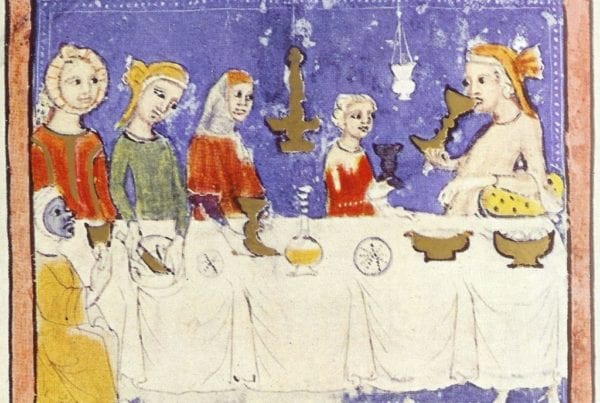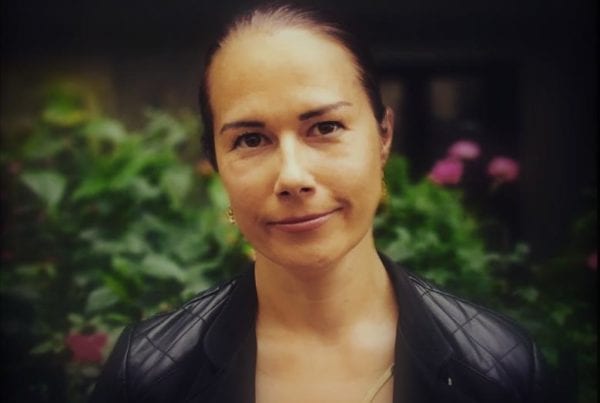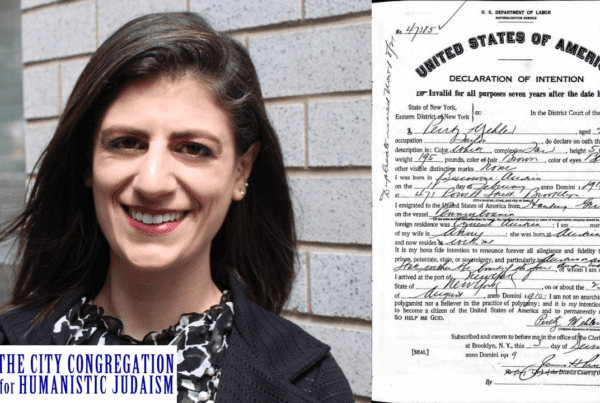
On July 24th, 2020, we had the honor and pleasure of having a few of our members share stories about feminist authors who changed their lives. Deb Freeman, Anna Genoese and Gladys Foxe, gave us permission to share their talks.
This event was a the first in our new program series, “My Humanistic Author”, in which members share how a creator – author, director, artist, poet, etc. – made a significant Humanistic impact on their lives. If you are a member and would like to share a story of a creator who changed your life, please contact the shabbat committee.
Deb Freeman talked about the author Penelope Fitzgerald, the video of her talk is followed by the text of her talk.
Anna Genoese talked about the author Marge Piercy, the text of their talk is posted below.
Gladys Foxe spoke about the ways psychoanalyst Melanie Klein, First Lady Eleanor Roosevelt, and academic Carolyn Heilbrun influenced her life. Her recording is posted below.
Watch a recording of Deb’s presentation:
Thoughts on Penelope Fitzgerald – Deborah Freeman
Because I read a lot of novels – friends sometimes ask me to recommend a good book to read. I often suggest the prize winning English author Penelope Fitzgerald. Her novels vary widely in subject and setting – no 2 are alike. Another plus is that they’re all short – most are under 200 pages — which makes them very accessible. Penelope Fitzgerald’s life was as varied and dramatic as her fiction. She published her first novel when she was 60 years old — and achieved her greatest fame at age 80 — giving hope to late bloomers everywhere.
Fitzgerald was born in 1916 into a brilliant and accomplished family. Her father was a bishop and her uncles were all well-known authors, scholars and cryptographers. She was one of the first women students at Oxford — where she was known as the blond bombshell. In a family of high achievers –her future success was taken for granted.
Her marriage in 1942 to a handsome young Irish army officer started out promisingly. Unfortunately, Desmond Fitzgerald was an alcoholic and he was disbarred for forging checks. The end of his legal career led to a life of poverty for the family. Penelope and Desmond and their 3 children lived for awhile in a homeless center – then in subsidized public housing – and even on an old, leaky
houseboat on the Thames which ultimately sank, destroying all her books and papers.
This houseboat experience may have been a low point in her life — but it provided excellent material for a novel called Offshore — which won the Booker Prize in 1979. Her ability to turn even the unhappy experiences in her life into something positive has had a major impact on my outlook on life.
A good book to introduce you to the pleasure of reading Fitzgerald is Human Voices. This book combines two of my very favorite subjects – surviving in London during the air raids of WW2 — and radio production. While planning their approach to war reporting — the BBC made the ethical choice to tell the whole truth to the nation – rather than offering comforting falsehoods. The characters in the novel are all working to “scatter human voices into the darkness of Europe” – and this description of the power of human voices has definitely impacted my humanistic views.
Fitzgerald had worked for the BBC – and she vividly writes about the orderly chaos of the radio offices during war time. She writes that the large staff “varied between the intensely respectable and the barely sane.” The concert hall at the BBC was turned into a coed dorm for all-night shifts. There was the underlying possibility of being bombed – amid the constant affairs and flirtations.
While everyone takes their jobs very seriously – this is not your typical wartime service. One essential engineer’s job was to test sound equipment — and to the annoyance of his co-workers — he constantly played “the teddy bear’s picnic” with its curious changes from high volume to low.
I think Human Voices is a particularly wonderful book to read now while our own lives are undergoing mind-spinning changes — and don’t always seem particularly rational. Who knows if the equivalent of playing “the teddy bear’s picnic” will get us through our own challenging times.
Fitzgerald loved writing about institutions that have their own peculiar systems and routines. At another of her many jobs, she taught at a drama school for children where her pupils included Camilla, Duchess of Cornwall — now wife of Prince Charles. This school was the setting for a novel called At Freddie’s.
After writing 5 novels — all based on her varied life experiences — there was a dramatic change of direction. Her last 4 novels are set in various historical time periods – all far from England.
I particularly love The Beginning of Spring – which is about a small family-run English printing company located in Moscow in 1913. The coming Russian Revolution is in the background – but the owner’s biggest problems happen when his wife packs her bags and returns to England without a word to anyone – leaving him to take care of the children and the business.
So I hope you give her books a try – start anywhere – and please let me know if you read one – and what you think of it.
Read Anna’s presentation:
Marge Piercy is a science fiction author who published most of her work in the sixties and seventies, during what is colloquially known as the “second wave feminist science fiction movement”; other woman authors who published famous feminist science fiction at this time include Joanna Russ, Ursula LeGuin, and James Tiptree Jr.
Science fiction is a genre that was spearheaded by women, starting in 1666 with Margaret Cavendish, and more famously quote-unquote begun by Mary Shelley with Frankenstein in 1818. However, much of the genre was overtaken by men during what is known as the “Golden Age of Science Fiction” in the early to mid twentieth century, so you find that a lot of second wave feminist science fiction parodies or satirizes the fiction of men.
Woman on the Edge of Time by Marge Piercy does not do this, which makes it somewhat of a standout of its time. It comes late in the second wave of feminism (1976). It deals with a protagonist in her late 30s who is Mexican-American and lives in Spanish Harlem.
Very briefly, the focus of the novel is on criticizing mental health care in the 1970s, capitalism, violence, and breaking down what it means to have power. It includes a trope now considered unacceptable in fiction, in which the reader cannot tell if the protagonist is genuinely mentally ill, or if something supernatural really is happening.
Incredibly revolutionary even now is the introduction of a unisex pronoun—“per”. Per went to the garden. This milk belongs to per.
When I read this book as a young person, my immediate takeaway was the idea that a pronoun could be unisex or nonbinary. I had never been introduced to this before, despite a lifetime of being on the queer parts of the internet, and it was a magical idea to me. It spoke to me on a deep level, where I knew I was not a woman the way people assigned that gender to me, but also was clearly not a man. I immediately adopted thinking of myself as “a person” instead of he or she, and began a serious study of gender expression and identity.
Every time I read this book, I come away with something new to think about. The last time I read the book was just a few months ago, and I began to think seriously about the protagonist’s critique of one of the other characters, who is introduced without a gender. The protagonist assigns the character a gender of “man” and sees “him” as a potential romantic interest. When the protagonist learns the character has different genitalia than expected, the protagonist feels betrayed and upset, and even though the character has not changed at all, the protagonist no longer sees per as a romantic interest.
This struck me as such a quote-unquote trans panic moment; despite being attracted to a person on multiple levels, what a person’s genitals are can be so important to someone that they abandon a happiness they could find. I find that personally baffling, on all levels: romantic, sexual, scientific. I have been thinking about it on and off ever since, trying to understand how something like that can be important to a person, and failing to put myself in the place of a person who feels that way.
Side note, I did not believe cisgender heterosexual people actually existed until well into my thirties.
This book changed my life entirely. It gave me the opportunity to think critically about my own gender identity in a way that I never had before; it gave me a name to put to my feelings that until then had just been an uncomfortable muddle; it pulled me into the idea that a world could be created by the people in it instead of just tolerated.
Marge Piercy is Jewish, and views her creative work as part of tikkun olam, making the world a better place, and I could not agree more.
Watch a recording of Gladys’ presentation:
To see upcoming events or watch them live, check out our calendar



